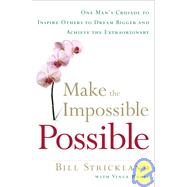
Note: Supplemental materials are not guaranteed with Rental or Used book purchases.
Purchase Benefits
What is included with this book?
BILL STRICKLAND is president of Manchester Craftsmen Guild and the Bidwell Training Center. The Bidwell Training Center today offers programs in ceramics, photography, and painting to over 500 kids a year, as well as 3500 additional students in the Pittsburgh inner-city school district. Ninety percent of them get high school diplomas and enroll in college. And at the Bidwell Training Center, over 1000 adults each semester receive training in professional careers like the culinary arts, pharmacology, and horticultural technology. Through partnerships with major corporations in the area, the Manchester Craftsmen Guild has helped 80 percent of its graduates land meaningful full-time employment. Manchester Bidwell is now a breathtaking facility that includes a 350-seat jazz auditorium, a 40,000-square-foot greenhouse covering half a city block, a state-of-the-art chemistry lab, a full-scale ceramics department, and a culinary institute. He has received a MacArthur Foundation “genius” grant, lectured at Harvard Graduate School of Education, and served on the board of the National Endowment for the Arts. He lives in Pittsburgh, Pennsylvania.
| From the Ghetto to Harvard Business School | p. 1 |
| Growing Up | p. 28 |
| A Dream Is Born | p. 50 |
| Expanding Our Mission | p. 72 |
| The Secret to Success | p. 102 |
| Impossibility Thinking | p. 128 |
| The Power of Passion | p. 147 |
| Swing | p. 172 |
| Reach | p. 193 |
| Purpose | p. 219 |
| Index | p. 229 |
| Table of Contents provided by Ingram. All Rights Reserved. |
The New copy of this book will include any supplemental materials advertised. Please check the title of the book to determine if it should include any access cards, study guides, lab manuals, CDs, etc.
The Used, Rental and eBook copies of this book are not guaranteed to include any supplemental materials. Typically, only the book itself is included. This is true even if the title states it includes any access cards, study guides, lab manuals, CDs, etc.
Excerpted from Make the Impossible Possible: One Man's Crusade to Inspire Others to Dream Bigger and Achieve the Extraordinary by Bill Strickland
All rights reserved by the original copyright owners. Excerpts are provided for display purposes only and may not be reproduced, reprinted or distributed without the written permission of the publisher.